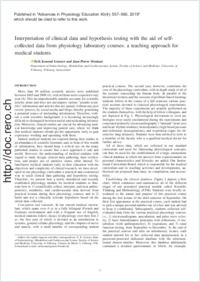Interpretation of clinical data and hypothesis testing with the aid of self-collected data from physiology laboratory courses: a teaching approach for medical students
- Grasser, Erik Konrad Department of Endocrinology, Metabolism and Cardiovascular System, Faculty of Science and Medicine, University of Fribourg, Fribourg, Switzerland
- Montani, Jean-Pierre Department of Endocrinology, Metabolism and Cardiovascular System, Faculty of Science and Medicine, University of Fribourg, Fribourg, Switzerland
-
07.11.2019
Published in:
- Advances in Physiology Education. - 2019, vol. 43, no. 4, p. 557–560
English
More than 50 million scientific articles were published between 1665 and 2009 (4), with millions more expected every year (6). This incomprehensible number accounts for scientific articles alone and does not encompass various “pseudo-scientific” information and articles that are spread, without any peer review process, by social media and blogs, thereby generating a potential source of misleading information. Therefore, without a solid scientific background, it is becoming increasingly difficult to distinguish between useful and misleading information. Moreover, clinical studies are crucial for advancing medical knowledge and improving patient care, where we think that medical students should get the opportunity early to gain experience working and operating with them.Indeed, medical students are exposed during their studies to an abundance of scientific literature, and, in front of this wealth of information, they should keep a critical eye on the many published studies to ensure that a new approach is safe and useful. However, the understanding of medical students with regard to study design, clinical data gathering, data verification, and proper use of statistics seems often limited. To familiarize medical students early in their education with the objectives and complexity of clinical research, we have developed in our physiology curriculum a practical and economical way to teach clinical data gathering and hypothesis testing. Therefore, we present here a newly introduced and recently established physiology module for medical students to illustrate how to 1) scientifically collect, interpret, and treat anthropometric, metabolic, and cardiovascular data derived from practical lessons during their physiology courses; and to 2) build and test a clinically relevant hypothesis based on the initial data collected.
- Faculty
- Faculté des sciences et de médecine
- Department
- Département de Médecine
- Language
-
- English
- Classification
- Medicine
- License
-
License undefined
- Identifiers
-
- RERO DOC 327720
- DOI 10.1152/advan.00110.2019
- Persistent URL
- https://folia.unifr.ch/unifr/documents/308504
Statistics
Document views: 121
File downloads:
- pdf: 141
